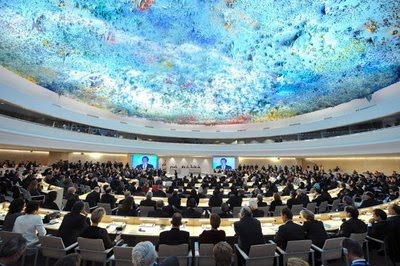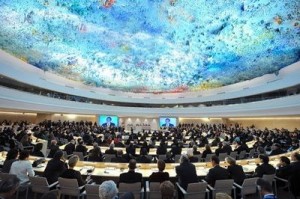The deteriorating human rights situation in Egypt was highlighted by civil society organizations at the 35th session of the UN Human Rights Council (UNHRC) held in Geneva. On Monday the 19th, the joint public panel “Egypt: The Price of Silence” addressed the danger of the international community’s failure to respond to grave human rights violations. The silence of UN bodies like the UNHRC appears to have emboldened the Egyptian government in its unprecedentedly repressive campaign to silence dissent and crush independent civil society.
Panelists included Bahey eldin Hassan, Director of CIHRS; Nancy Okail, Director of the Tahrir Institute for Middle East Policy; and Sherif Mansour, Coordinator of the Middle East and North Africa program at the Committee to Protect Journalists. Discussion was moderated by Laila Matar from Human Rights Watch. The panelists condemned the escalating terrorist attacks in Egypt and the government’s exploitation of these attacks as a pretext to intensify its crackdown on all forms of opposition including civil society, political parties, the media, and syndicates. Human rights defenders, journalists, political activists, and others are relentlessly persecuted for defending fundamental rights and freedoms that are upheld by the Egyptian Constitution and protected under international agreements and conventions signed by the Egyptian government.
On June 16th, civil society organizations sent a joint letter to UNHRC member states addressing the dire human rights situation in Egypt resulting from the government’s campaign to stifle any semblance of opposition to its authoritarian rule. Repressive tactics include new legislations restricting the operation of independent non-governmental organizations, epitomized by last month’s new law regulating NGOs that effectively incapacitates independent civil society; media censorship and the imprisonment of journalists; prolonged pretrial detention without legal basis; and increasingly frequent cases of enforced disappearance, torture, and extrajudicial execution. The letter further addressed the Egyptian government’s deliberate disregard of its constitutional and international obligations to protect civil, political, economic, and social rights; as well as the Egyptian judiciary’s failure to hold those responsible for grave human rights violations to account.
An oral statement delivered by CIHRS to the UNHRC on June 15th detailed the current crackdown on civil society, exemplified by the government’s use of the foreign funding case against NGOs (no. 173/2011) to retaliate against rights groups. Politically motivated charges have been leveled against NGOs and their staff, such as receiving foreign funds with the purpose of undermining national security and interests— which could lead to 25 years in prison under Egyptian law. CIHRS has been charged with tarnishing Egypt’s image abroad through its work with the UN; a clear act of reprisal against CIHRS and its staff. Its assets, as well as the assets of its Director Bahey eldin Hassan, have been frozen; in addition to a travel ban imposed on the director of its office in Egypt, Mohamed Zaree. Several other organizations have had their assets frozen and at least 17 rights defenders in total have been banned from travel, with several having their personal assets frozen as well. Rights defenders from a dozen of organizations have been summoned for interrogation, accused of serious charges and facing potentially lengthy prison sentences – including life imprisonment – as a result of their human rights advocacy.
The 35th session of the HRC began in Geneva on June 6 and will last until June 23.
Share this Post


